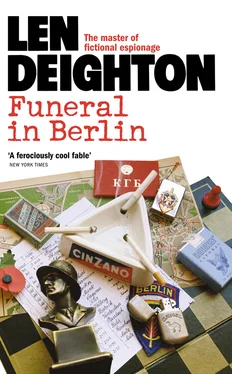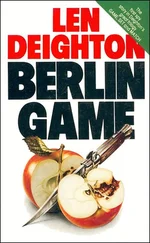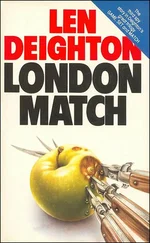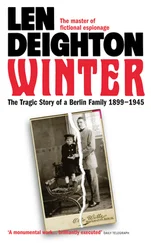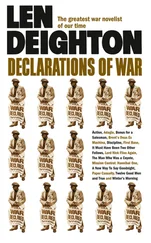‘Don’t tell me. You’ve come about the Semitsa business’, he said to the gas meter as he poured boiling water on to the Darjeeling. ‘You like Darjeeling?’
‘Darjeeling’s OK,’ I said. ‘What I’m not so keen about is you batting that name about like that. Have you ever heard of the Official Secrets Act?’
‘My dear boy, I am trussed up with the OS Act twice a year like a very old and intractable turkey.’ He put half a dozen wrapped sugar pieces on the table and said, ‘You won’t take milk in Darjeeling’: it wasn’t a question. He sipped his unsweetened tea from an antique Meissen cup; around mine it said ‘British Railways SR’ in brown grot letters.
‘So you are the man who is going to make Semitsa defect from the Moscow Academy of Sciences and come to work in the west; no, don’t tell me.’ He waved down my protest with a limp palm. ‘I’ll tell you. In the last decade not one Soviet scientist has defected westward. Did you ever ask yourself why?’ I unwrapped one of the sugar pieces; the paper had ‘Lyons Corner House’ printed on it in small blue letters.
‘This fellow Semitsa. A member of the Academy. Not a party member because he doesn’t need to be; Academy boys are the top dogs – the new elite. He probably gets about six thousand roubles 1 a month. Tax paid. On top of that he can keep any money he gets for lecturing, writing or being on TV. The lab restaurants are fabulous – fabulous. He has a town house and a country cottage. He has a new Zil every year and when he feels in the mood there is a special holiday resort on the Black Sea which only the Academy people use. If he dies his wife gets a gigantic pension and his children get special educational opportunities in any case. He works in the Genetics of Molecular Biology department where they use refrigerated ultra centrifuges.’ Hallam waved his sugar cube at me.
‘They are one of the basic tools of modern biology and they cost around ten thousand pounds each.’
He waited while that sank in.
‘Semitsa has twelve of them. Electron microscopes cost around fourteen thousand pounds each, he …’
‘OK,’ I said. ‘What are you trying to do, recruit me?’
‘I’m trying to let you see this situation from Semitsa’s point of view,’ said Hallam. ‘His biggest problems at this moment are likely to be whether to give his son a Zaporozhets or a Moskvich motor car for a twenty-first birthday present, and deciding which of his servants is stealing his Scotch whisky.’
Hallam unwrapped the sugar cube and ate it with a loud crunching noise.
‘What are you offering him? Have you seen those semi-detached houses they are putting the Porton people into? And as for the labs, they are little more than hardboard shacks. He’ll think it’s the prison camp and keep asking when he gets released,’ Hallam tittered.
‘OK,’ I said. ‘That’s enough dialectical materialism for one cup of Darjeeling. Just tell me if your people at the Home Office will do your bit if we deliver him to you.’
Hallam tittered again and extended a finger like he was tapping me on the nose.
‘You get him first, that’s all I’m saying. We’d love to have him. He’s the best enzyme man in the world today, but you just get him first.’
He popped another piece of sugar in his mouth and said, ‘We’d just love him, love him.’
One of the flies was beating on the window trying to escape; the sound of its buzzing wings rose to a loud frantic hammering. The tiny body smashing itself against the glass made faint clicks. As the energy oozed out of it, it sank down the glass, kicking and fluttering in fury at the force that had solidified the very air. Hallam poured more tea and dug around inside one of his little cupboards. He moved a packet of Omo and a wad of travel agents’ literature. The top leaflet showed people waving out of a bus which was parked in the Alhambra and said ‘Suntraps of Spain’ in blobby lettering. Across the side of the bus it said, ‘For as little as 31 guineas.’ He found a brightly coloured packet and gave a little yap of triumph.
‘Custard creams,’ he said.
He arranged two of them on an oval dish. ‘I don’t eat breakfast on Saturdays. Sometimes I go down the El Mokka for a sausage-and-chip lunch but quite often I manage with a biscuit.’
‘Thanks,’ I said. I took one.
‘You can’t trust the waiter there, though,’ said Hallam.
‘In what way?’ I asked.
‘They pad the bills,’ said Hallam. ‘Last week I found a shilling for bread and butter slipped in.’ He picked up the final few biscuit crumbs with a moistened finger-tip.
Outside in the hall I could hear a woman’s voice saying, ‘If I’ve told you once I’ve told you a thousand times – no bicycles.’
I couldn’t hear the man’s voice properly but the woman’s voice said, ‘Outside – that’s what we pay road taxes for.’
Hallam said, ‘I never have bread and butter.’
I sipped my tea and nodded while Hallam opened the window for the fly.
Hallam said, ‘And what’s more he knows it.’ Hallam gave a little laugh at the irony of life with an emphasis on the frailty of human nature.
‘He knows it,’ said Hallam again. Suddenly he said to me, ‘You aren’t sitting on my Bartoks by any chance?’
Hallam counted his records in case I had hidden a couple in my raincoat. He collected the cups and stacked them near the sink ready for washing.
He plucked back his sleeve to commune with a large wristwatch. He looked at it for a second or so before he carefully undid the grimy leather strap. The glass was scratched with a thousand tiny scratches and one or two deep ones. The green hands had come to rest at 9.15. Hallam held the watch to his ear.
‘It’s 11.20,’ I told him.
He shushed me and his eyes rolled gently to demonstrate the expertise with which he was listening to the silent mechanism.
I could take a hint. Hallam had the door open before I had even said, ‘Well I must …’
He walked behind me through the hall to make sure that I didn’t steal the lino. A fanlight over the entrance let a William Morris design in coloured sunlight fall across the stone floor. Fixed against one wall was a pay telephone with notices and old undelivered mail marked ‘Inland Revenue’ tucked behind the telephone directories. One notice said ‘Miss Mortimer is away in Spain on business.’ It was written in lipstick on the back of a used envelope.
At waist level the old brown wallpaper had suffered a series of horizontal white gashes. From the floor under them Hallam picked up a tin that had the words ‘Acme Puncture Outfit’ enmeshed in a design of scrolls, daisies and bicycle wheels. He made a clicking noise with his tongue and put the tin on top of the A – D telephone directory.
Hallam gripped the huge street door with two hands. Another notice on it said ‘Slamming this at night disturbs early risers.’ The Daily Mail and the yoghurt were still in the same position and from farther down the street I could hear the clink of milk bottles.
Hallam offered me a hand like a dead animal. ‘Best enzyme man,’ he said.
I nodded. ‘In the world,’ I said, and eased sideways through the partly open door.
‘Give him this,’ said Hallam. He pushed a wrapped cube of Lyons sugar into my hand.
‘Semitsa?’ I said very quietly.
‘The milkman’s horse, you silly. There. Friendly creature. And if you do see Confucius …’
‘OK,’ I said. I walked down the steps into the hot dusty sunlight.
‘My goodness. I haven’t paid you back for the gasmeter shilling,’ said Hallam. It was a simple statement of fact; he wasn’t turning his pockets out.
‘Donate it to the RSPCA,’ I called. Hallam nodded. I looked around but there was no sign of Confucius anywhere.
Читать дальше
